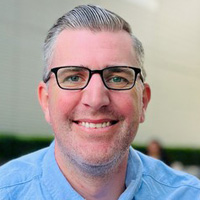Could Donor-Advised Funds Soon Be as Popular as 401(k)s?
Interest in this charitable giving tool is growing as it offers simplicity and tax benefits similar to 401(k)s.


Profit and prosper with the best of Kiplinger's advice on investing, taxes, retirement, personal finance and much more. Delivered daily. Enter your email in the box and click Sign Me Up.
You are now subscribed
Your newsletter sign-up was successful
Want to add more newsletters?

Delivered daily
Kiplinger Today
Profit and prosper with the best of Kiplinger's advice on investing, taxes, retirement, personal finance and much more delivered daily. Smart money moves start here.

Sent five days a week
Kiplinger A Step Ahead
Get practical help to make better financial decisions in your everyday life, from spending to savings on top deals.

Delivered daily
Kiplinger Closing Bell
Get today's biggest financial and investing headlines delivered to your inbox every day the U.S. stock market is open.

Sent twice a week
Kiplinger Adviser Intel
Financial pros across the country share best practices and fresh tactics to preserve and grow your wealth.

Delivered weekly
Kiplinger Tax Tips
Trim your federal and state tax bills with practical tax-planning and tax-cutting strategies.

Sent twice a week
Kiplinger Retirement Tips
Your twice-a-week guide to planning and enjoying a financially secure and richly rewarding retirement

Sent bimonthly.
Kiplinger Adviser Angle
Insights for advisers, wealth managers and other financial professionals.

Sent twice a week
Kiplinger Investing Weekly
Your twice-a-week roundup of promising stocks, funds, companies and industries you should consider, ones you should avoid, and why.

Sent weekly for six weeks
Kiplinger Invest for Retirement
Your step-by-step six-part series on how to invest for retirement, from devising a successful strategy to exactly which investments to choose.
As the economy continues to ebb and flow in a post-COVID world, consumers are looking for straightforward financial wins, but often they aren’t sure what moves to make or what tools to use. Most Americans are aware of 401(k)s, even though 40% of Americans do not fully understand the fees and the rules surrounding them.
Like 401(k)s, there is another type of account that can bring financial benefits to a large number of Americans and is rapidly growing in popularity. It’s called a donor-advised fund (DAF), which is a tax-deductible financial account for charitable giving.
What a Donor-Advised Fund Can Do for You
A reader might be asking, “How could that be beneficial to me?” Just like a 401(k) makes retirement simpler, a DAF simplifies giving while providing powerful tax advantages and investing options. Here are three consumer benefits donor-advised funds offer:
From just $107.88 $24.99 for Kiplinger Personal Finance
Become a smarter, better informed investor. Subscribe from just $107.88 $24.99, plus get up to 4 Special Issues

Sign up for Kiplinger’s Free Newsletters
Profit and prosper with the best of expert advice on investing, taxes, retirement, personal finance and more - straight to your e-mail.
Profit and prosper with the best of expert advice - straight to your e-mail.
- First, donor-advised funds give consumers one place for all their giving (on one consolidated tax receipt), like a checking account but for philanthropy.
- Second, consumers can easily donate stock, cryptocurrency or other assets into their account and avoid capital gains tax while distributing proceeds to any charity.
- Third, because dollars are eligible for tax advantages the moment they hit the account rather than when they are sent to charities, donors can take the time they need to discover high-impact charitable opportunities without worrying about tax implications. Most DAFs allow the money to be invested while it is in the account, and it can grow tax free.
All of this allows for greater opportunity to be smart about your giving.
More than the financial smarts, DAFs help you give more purposefully, which can help you live a richer life. The act of giving is associated with many aspects of psychological and relational well-being, and this type of account enables greater flexibility for donors to participate in giving, even if a donor isn’t sure yet what cause to support.
Corporate donors are also catching on. DAFs are increasingly being used to support workplace giving programs as an alternative to federated funds (e.g. the United Way) and corporate foundations.
How DAFs Have Improved Recently
In recent years, donor-advised funds have become more straightforward to create and use. Many sponsors now offer low-fee exchange-traded funds (ETFs) as investing options, and because of increases in technology, administrative fees and minimums to open have come down. Additionally, they don’t require sensitive information like Social Security numbers to set up, and each sponsor ensures each charity is in good standing with the IRS. Startups in the space, such as Charityvest, are accelerating this movement to make DAFs more delightful and to lower fees.
It’s no surprise DAFs are growing quickly. In one year alone, from 2019 to 2020, the number of DAF accounts jumped 16.3% to more than 1 million.
At Charityvest, we’ve witnessed success firsthand through our growth over the past three years. We started Charityvest because we wanted to make giving more purposeful, allowing for better planning in how and where people give. Users can make tax-deductible contributions of cash, stock, complex assets or cryptocurrency into their fund, and then direct those funds to over 1.4 million nonprofits in the U.S., while keeping their giving on a single consolidated tax receipt. With the introduction of low-fee ETF portfolios earlier this year, users can invest their fund balance to grow their giving, with all-in fees 25%-50% lower than the leading providers in the DAF space. Simply, the idea was to make giving easier, and more purposeful, and we believe DAFs do that.
The industry is experiencing remarkable growth as individuals and institutions increasingly see DAFs as their preferred way to give and facilitate giving. The opportunity to become more purposeful and streamline giving is a powerful combination. Technology and innovation are pushing these accounts to more people, making tax-smart, easy, thoughtful giving available to everyone who wants to donate to charities, in the same way the 401(k) did for retirement.
Profit and prosper with the best of Kiplinger's advice on investing, taxes, retirement, personal finance and much more. Delivered daily. Enter your email in the box and click Sign Me Up.

Stephen is President of DAFs at Foundation Source, a philanthropy technology company serving donors, institutions, and workplaces with turnkey philanthropic solutions. He is also the founder and a board director of Charityvest, a donor-advised fund sponsor, and Chairman of the Board of Teen Advisors, a nonprofit helping teenagers confront the young adult mental health crisis through peer-to-peer influence. Prior to building philanthropy technology, he worked as a consultant to philanthropists, corporations and private equity, most recently with Bain & Company.
-
 How Much It Costs to Host a Super Bowl Party in 2026
How Much It Costs to Host a Super Bowl Party in 2026Hosting a Super Bowl party in 2026 could cost you. Here's a breakdown of food, drink and entertainment costs — plus ways to save.
-
 3 Reasons to Use a 5-Year CD As You Approach Retirement
3 Reasons to Use a 5-Year CD As You Approach RetirementA five-year CD can help you reach other milestones as you approach retirement.
-
 Your Adult Kids Are Doing Fine. Is It Time To Spend Some of Their Inheritance?
Your Adult Kids Are Doing Fine. Is It Time To Spend Some of Their Inheritance?If your kids are successful, do they need an inheritance? Ask yourself these four questions before passing down another dollar.
-
 The 4 Estate Planning Documents Every High-Net-Worth Family Needs (Not Just a Will)
The 4 Estate Planning Documents Every High-Net-Worth Family Needs (Not Just a Will)The key to successful estate planning for HNW families isn't just drafting these four documents, but ensuring they're current and immediately accessible.
-
 Love and Legacy: What Couples Rarely Talk About (But Should)
Love and Legacy: What Couples Rarely Talk About (But Should)Couples who talk openly about finances, including estate planning, are more likely to head into retirement joyfully. How can you get the conversation going?
-
 How to Get the Fair Value for Your Shares When You Are in the Minority Vote on a Sale of Substantially All Corporate Assets
How to Get the Fair Value for Your Shares When You Are in the Minority Vote on a Sale of Substantially All Corporate AssetsWhen a sale of substantially all corporate assets is approved by majority vote, shareholders on the losing side of the vote should understand their rights.
-
 How to Add a Pet Trust to Your Estate Plan: Don't Leave Your Best Friend to Chance
How to Add a Pet Trust to Your Estate Plan: Don't Leave Your Best Friend to ChanceAdding a pet trust to your estate plan can ensure your pets are properly looked after when you're no longer able to care for them. This is how to go about it.
-
 Want to Avoid Leaving Chaos in Your Wake? Don't Leave Behind an Outdated Estate Plan
Want to Avoid Leaving Chaos in Your Wake? Don't Leave Behind an Outdated Estate PlanAn outdated or incomplete estate plan could cause confusion for those handling your affairs at a difficult time. This guide highlights what to update and when.
-
 I'm a Financial Adviser: This Is Why I Became an Advocate for Fee-Only Financial Advice
I'm a Financial Adviser: This Is Why I Became an Advocate for Fee-Only Financial AdviceCan financial advisers who earn commissions on product sales give clients the best advice? For one professional, changing track was the clear choice.
-
 I Met With 100-Plus Advisers to Develop This Road Map for Adopting AI
I Met With 100-Plus Advisers to Develop This Road Map for Adopting AIFor financial advisers eager to embrace AI but unsure where to start, this road map will help you integrate the right tools and safeguards into your work.
-
 The Referral Revolution: How to Grow Your Business With Trust
The Referral Revolution: How to Grow Your Business With TrustYou can attract ideal clients by focusing on value and leveraging your current relationships to create a referral-based practice.